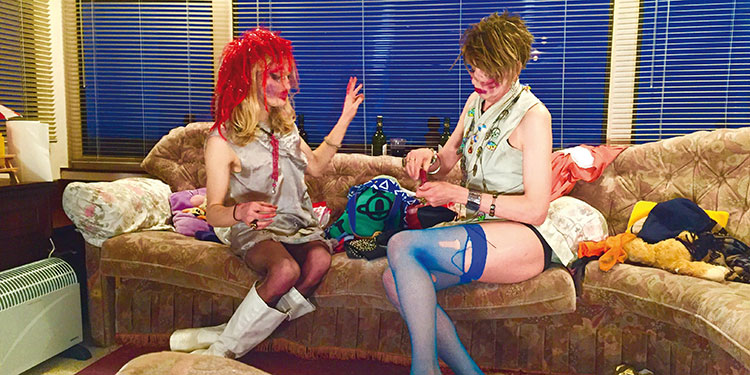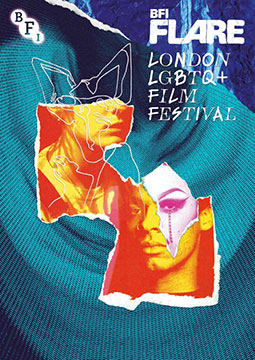
Director: Gary Reich
Running Time: 84 mins
Certificate: NR
Release Date: March 24th 2018 (UK)

Back in 2010 we got the movie Uncle David, about a middle-aged man – the David (David Hoyle) of the title – going to the Isle Of Sheppey with his younger lover/protégé. Now we have the sequel, which has a similar set-up with David back in his Sheppey caravan with a different young person – the genderqueer Michelle. Again David is pontificating about what he sees as the social ills of the world, although as those who’ve seen the first film will know, he’s got his own secrets and may be more dangerous than he first appears.
Into the mix come the almost feral Max and his sister, who are struggling for survival. The sister takes an interest in David and Michelle, but Max is wary of them. That doesn’t stop him taking an interest in Michelle though.
As with the first movie, the whole thing was improvised and shot on location over a couple of days. There was little plan for exactly what would happen on screen, and only one take of each scene was allowed. The result, rather like its predecessor, is a love it or hate it proposition.
David Hoyle has an almost cult-like following, harking back to his ‘anti-Drag Queen’ days as The Divine David, and has continued over the years through a series of one-man shows. This is a film that’s only likely to appeal to those in the Hoyle cult or its potential devotees. Most others will find the whole thing tedious, contradictory, way too pleased with itself and above all, boring. Perhaps an even bigger sin is that the earlier film had precious few interesting ideas and this one just rehashes those crumbs. The biggest problem is Hoyle, as the movie is so in thrall to him and his character. Although some of his pontificating about bourgeois culture and society is interesting, much of it is solipsistic and not that smart.
That might have been fine, but the movie offers so little context or anyone to counterpoint him. He is allowed to warble on, but with no one properly engaging with his diatribes, it’s impossible to know how to react to it – beyond that ‘Uncle David’ likes the sound of his own voice. He could be a genius, but neither this film nor the earlier one give any space for the audience to decide. It is perhaps a hangover from the fact that for much of Hoyle’s career he has been the centrepoint of his his own one-person act, but that’s not true here and so it doesn’t work.
Are we supposed to agree with David? Are we meant to see him as a ridiculous figure whose over the top ideas are exposed by his tangential existence in the caravan? Is he a predatory monster? Is he, like the movie, disjointed and unable to add up to anything in particular? Is David supposed to be a self-aware meta deconstruction of Avant Garde pretentions, or is he merely an exaggerated version of an underlying truth? Is Max the lived version of David’s ideas, and if so is he exposing the flaws of David’s anarchist thought? There’s the potential for all these things to be true, but the movie is so focussed on him there’s nothing to anchor him against.
What’s a particular shame is that the other three cast members are more interesting, and the film is more engaging when focused on them. Whether it’s Michelle and Max’s flirtation, or the sister bonding with Michelle in the caravan, there’s far more emotional connection and drive to the film when it’s looking at them. There’s also a more intriguing social deconstruction when these outsider characters interact with one another, something that isn’t true when David’s around. When David is on screen the other person always seems irrelevant; they’re just something for him to preach at.
While I found the whole thing pretentious, tedious and dull, others at the screening found it tense, profound and fascinating. I can’t help feeling you need to be in the Hoyle-ish cult to properly appreciate it, perhaps satisfied with appreciating moments and ideas without worrying too much about whether they coalesce into something more than that (certain questions during the Q&A following the screening suggested that might be true). Maybe that’s the ultimate point – David is concerned about the vacuousness and dangers of the military-industrial complex, but what he’s got to offer is equally meaningless. The result is an absolute nihilism, where it’s not the outside world that’s the problem – it’s David who’s the oubliette of nothingness.
Overall Verdict: Fans of David Hoyle may like it, but many others are likely to find it annoying, dull, pretentious and lots of potent adding up to nothing.
Reviewer: Tim Isaac
Leave a Reply (if comment does not appear immediately, it may have been held for moderation)